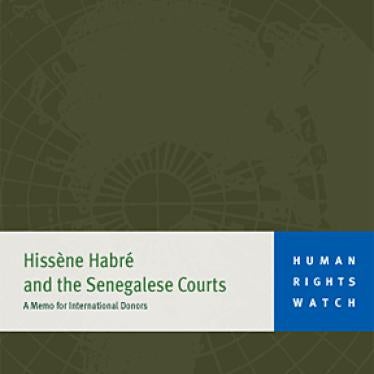(Dakar)- In the wake of today’s ruling by a Senegalese court that it had no jurisdiction to rule on the extradition of Chad's exiled former dictator, Hissène Habré, Human Rights Watch called on Senegal’s president to proceed with Habré’s extradition to Belgium, where he is wanted to stand trial on atrocity charges.
The Court of Appeals of Dakar could have rejected the extradition request, but did not do so. Under Senegalese law, in the absence of such a rejection, the decision apparently goes to Senegalese President Abdoulaye Wade, who had promised in the past that he would extradite Habré if the matter were up to him.
Victims and their supporters called on President Wade to sign the extradition decree.
"Today’s ruling kicks the ball back to the prosecutor and to President Wade,” said Reed Brody of Human Rights Watch, who was at the Dakar courthouse. “Habré’s victims, who have been fighting for justice for 15 years, are not giving up now."
"Now it is up to President Wade to make good on his word and sign the extradition decree so that Hissène Habré can be sent to Belgium and receive a fair trial," said Alioune Tine of the Dakar-based African Assembly for the Defense of Human Rights (RADDHO).
"We are now counting on President Wade. Please don’t let us down!" said Ismael Hachim, President of the Chadian Association of Victims of Political Repression and Crime (AVCRP), who spent two years in Habré's prisons and was subject to the "Arbatachar," a frequent form of torture, in which a prisoner's four limbs were tied together behind his back, leading to loss of circulation and paralysis.
On September 27, 2001, President Wade stated, “If a country capable of organizing a fair trial - there is talk of Belgium - wants him, I do not foresee any obstacle. On February 23, 2003, Wade reaffirmed this, saying : “Any country which wishes to can introduce an extradition request before our judicial system. It will receive, at least as far as I am concerned, a favorable response.” Last week, however, President Wade has said that he would consult with African leaders before making a final decision.
On Thursday, Chad’s President Idriss Déby called on President Wade to “do as he said” and extradite Habré to Belgium.
The Court of Appeals said that it could not rule on the extradition request because of Habré’s immunity as a former head of state. However, under international law, the immunity of current and former office-holders belongs to the state and not the individual. In 2002, the Chadian justice minister wrote to the Belgian judge to state that "Mr. Hissène Habré can not claim to enjoy any form of immunity from the Chadian authorities."
Hissène Habré ruled the former French colony of Chad from 1982 until 1990, when he was deposed by President Déby and fled to Senegal. His one-party regime was marked by widespread atrocities. Habré periodically targeted various ethnic groups such as the Sara (1984), Hadjerai (1987), and the Zaghawa (1989), killing and arresting group members en masse when he believed that their leaders posed a threat to his regime. Files of Hissène Habré’s political police, discovered by Human Rights Watch in 2001, reveal the names of 1,208 persons who died in detention, as well as over 12,000 victims of different abuses.
In February 2000, a Senegalese court charged Habré with torture and crimes against humanity and placed him under house arrest. But in March 2001, Senegal’s highest court said that Habré could not stand trial in Senegal for crimes allegedly committed elsewhere. Habré’s victims immediately announced that they would seek Habré’s extradition to Belgium, where 21 of Habré’s victims had filed suit. A four-year investigation by a Belgian judge resulted in an international arrest warrant against Habré on September 19, 2005 and his arrest on November 15.
The extradition of Hissène Habré is supported by prominent international figures including U.N. Secretary-General Kofi Annan, U.N. High Commissioner for Human Rights Louise Arbour, and African Union President Alpha Oumar Konaré as well as Manfred Nowak, the U.N. special rapporteur on torture, and Christos Pourgourides, chair of the Parliamentary Assembly of the Council of Europe’s Sub-Committee on Human Rights.
Two weeks ago, thousands of Chadians took to the streets of N’Djamena
to renew their support for the extradition of the former dictator of their country.






